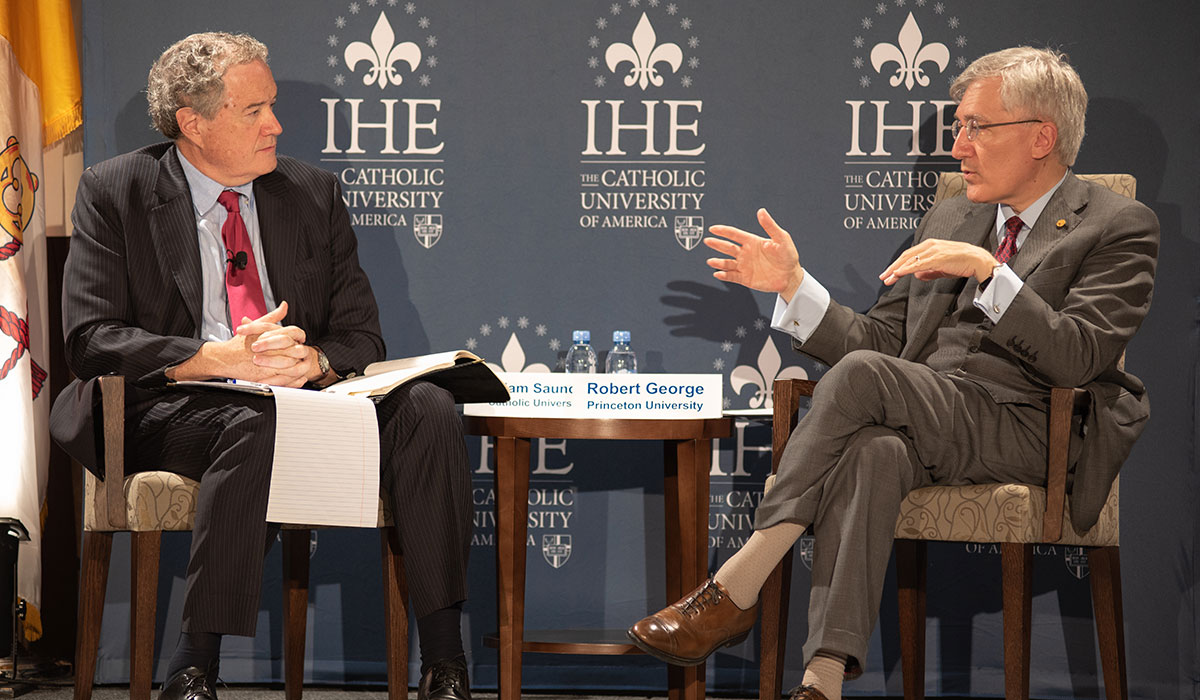

Photo by D. McQuade
More than 80 students, faculty, and members of the local community gathered for a discussion of human rights and religious liberty with Robert George, Princeton University’s McCormick Professor of Jurisprudence at The Catholic University of America’s Heritage Hall on Sept. 20th.
The discussion, which was hosted by the Institute for Human Ecology, was held to commemorate the 70th anniversary of the signing of the Universal Declaration of Human Rights. The lecture also marked the opening of a new Center for the Study of Human Rights at Catholic University, along with an interdisciplinary degree, a Master of Arts in Human Rights.
Throughout the hour-long conversation, George answered questions from William Saunders, an IHE fellow who serves as director of the master’s program and the Center for the Study of Human Rights in the School of Arts and Sciences.
George, who is a member of the Center’s advisory council, began the conversation by discussing the positive influence the Universal Declaration of Human Rights has had on the world since it was issued on Dec. 10, 1948, as a response to the horrific violence seen during the two World Wars.
He called the declaration “an extraordinary achievement” that brought together people from many different faiths and backgrounds to “make a profound statement of the dignity of the human person … and an affirmation of the rights that human beings have, not in virtue of any special strengths — beauty, intelligence, social standing — but simply in virtue of their humanity.”
Though he noted that the document is “not self-executing,” George said that it “gives civil society an instrument in the name of which to demand of repressive governments and offending regimes respect for the dignity of the human person and his rights.”
Continuing the conversation, Saunders and George discussed how the declaration — in Saunders’ words — is “not a perfect document.” Among the dangers of the declaration, the two professors noted, is how easily its language can be used to promote specific ideologies.
“Whenever the rhetoric of a good thing becomes the dominant rhetoric, then people are going to seize upon that rhetoric to advance whatever agenda, whatever ideology they have,” said George. “People will try to win at ideological battles, advance their agendas whatever they are, with the language of human rights. So they’ll inflate claims, whatever they desire, and treat it not as a desire, a want, a feeling, a passion, but a human right.
“We lose our sense of the power and importance of the fundamental rights because of the inflation that happens when you conflate whatever it is you desire, whatever is on your agenda, with rights,” George said.
Saunders and George also spoke about the many responsibilities that go along with human rights, and the differences between positive and negative rights, and how the idea of religious freedom ties in with the declaration of human rights.
At the beginning of the night’s event, George spoke highly of Catholic University’s new Center for the Study of Human Rights, which seeks to bring the Catholic perspective to bear on the discussion and understanding of human rights. The master’s program, which is accepting students now, will begin officially in Fall 2019.
“I think this institution will really bring something new to the table,” George said. “That is an understanding of human rights rooted in the deep tradition of thought that takes us back to Athens and to Jerusalem, an approach to human rights that really anchors human rights in the truth about the human person and the flourishing of the human person. … We need that kind of deep understanding.”
In his introductory statements, Moral Theology Professor Joseph Capizzi, executive director of the Institute for Human Ecology, spoke about the new center and master’s program. He said the program is unique because it “draws on the interdisciplinary strength of this University and also the Catholic intellectual tradition.” Aaron Dominguez, the Dean of the School of Arts and Sciences, also gave introductory remarks welcoming the establishment of the Center and of the master of arts degree.
For more information about the new master’s program in human rights, please contact William Saunders, Program Director at saunderswl@cua.edu.